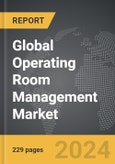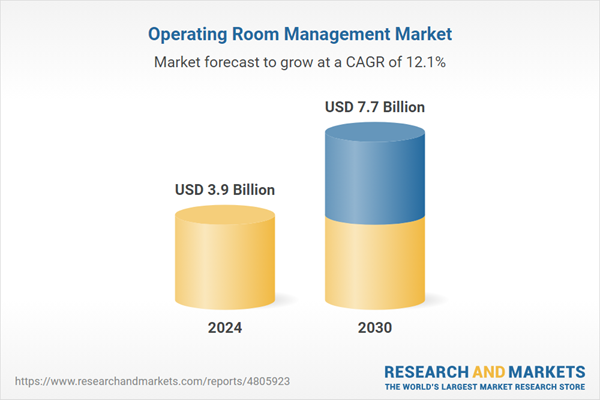Global Operating Room Management Market - Key Trends & Drivers Summarized
How Is Operating Room Management Evolving in Modern Healthcare?
Operating room management has become a critical focus area for hospitals and surgical centers as healthcare systems face increasing pressure to improve efficiency, reduce costs, and enhance patient outcomes. Effective operating room management involves the coordination of various processes, including scheduling, resource allocation, staff management, and patient flow, to ensure that surgeries are conducted efficiently while minimizing delays and downtime. Advanced operating room management software has transformed how hospitals plan and execute surgical procedures by providing real-time data on patient status, room availability, and staff performance. This shift toward data-driven decision-making enables hospitals to optimize operating room utilization, reduce cancellations, and increase the overall throughput of surgical cases. In addition to improving operational efficiency, modern operating room management systems help hospitals track critical metrics such as surgical times, infection rates, and equipment usage, allowing for continuous improvement in patient care.What Trends Are Shaping Operating Room Management in Healthcare?
Several trends are shaping the operating room management market, driven by the need for greater efficiency and better patient outcomes. One of the key trends is the increasing use of data analytics and predictive modeling to optimize surgical scheduling and resource allocation. By analyzing historical data, hospitals can forecast demand for surgeries, identify potential bottlenecks, and make informed decisions about staffing and equipment needs. Another significant trend is the integration of artificial intelligence (AI) into operating room management systems. AI algorithms can predict surgery durations, suggest optimal surgical team configurations, and even alert staff to potential complications based on patient data. The push for minimally invasive surgeries has also influenced operating room management, as these procedures tend to have shorter recovery times, necessitating faster room turnover and more efficient scheduling. Additionally, the focus on reducing healthcare costs is driving hospitals to invest in systems that can track and reduce waste, from unused surgical supplies to idle equipment.How Is Technology Enhancing Operating Room Management?
Technology plays a pivotal role in modernizing operating room management, providing tools that enhance efficiency, safety, and decision-making. The use of real-time data analytics allows hospital administrators to monitor operating room performance and make adjustments as needed, improving both patient outcomes and resource utilization. Predictive analytics and AI are being used to forecast surgical demands, helping hospitals allocate resources more effectively and reduce downtime between procedures. Additionally, operating room management systems are now integrated with hospital-wide electronic health records (EHR), ensuring that patient data is readily accessible and up to date, reducing errors and enhancing communication between surgical teams. Cloud-based solutions enable remote access to scheduling and management tools, allowing for greater flexibility in managing operating room logistics. Automated workflows are also being implemented, from instrument tracking to sterilization processes, reducing human error and improving compliance with regulatory standards. In addition, advancements in telemedicine are opening the door for remote collaboration in operating room management, allowing experts to consult or assist in surgery planning from different locations.What Is Driving the Growth in the Operating Room Management Market?
The growth in the operating room management market is driven by several factors, including the increasing complexity of surgical procedures and the need for hospitals to maximize efficiency in resource utilization. The rise in minimally invasive surgeries, which often require quicker room turnover and shorter recovery times, has made effective operating room management more critical than ever. The growing emphasis on data-driven decision-making is also driving demand for advanced management systems that offer real-time analytics and predictive modeling, helping hospitals optimize scheduling, staffing, and equipment usage. Technological innovations such as AI, machine learning, and automation are enhancing the capabilities of operating room management platforms, making it easier to track performance metrics, reduce errors, and improve patient outcomes. Furthermore, the need to reduce healthcare costs while maintaining high standards of patient care is prompting hospitals to invest in solutions that can improve operating room efficiency and reduce waste. Finally, the increasing demand for compliance with regulatory standards related to patient safety, data privacy, and infection control is further fueling the adoption of comprehensive operating room management systems.Report Scope
The report analyzes the Operating Room Management market, presented in terms of market value (USD). The analysis covers the key segments and geographic regions outlined below.- Segments: Component (Software, Services); Deployment (On-Premise, Cloud, Web-Based Solutions); End-Use (Hospitals, Ambulatory Surgery Centers).
- Geographic Regions/Countries: World; United States; Canada; Japan; China; Europe (France; Germany; Italy; United Kingdom; and Rest of Europe); Asia-Pacific; Rest of World.
Key Insights:
- Market Growth: Understand the significant growth trajectory of the Operating Room Management Software segment, which is expected to reach US$5.8 Billion by 2030 with a CAGR of 12.8%. The Operating Room Management Services segment is also set to grow at 10.1% CAGR over the analysis period.
- Regional Analysis: Gain insights into the U.S. market, valued at $1.1 Billion in 2024, and China, forecasted to grow at an impressive 11.3% CAGR to reach $1.2 Billion by 2030. Discover growth trends in other key regions, including Japan, Canada, Germany, and the Asia-Pacific.
Why You Should Buy This Report:
- Detailed Market Analysis: Access a thorough analysis of the Global Operating Room Management Market, covering all major geographic regions and market segments.
- Competitive Insights: Get an overview of the competitive landscape, including the market presence of major players across different geographies.
- Future Trends and Drivers: Understand the key trends and drivers shaping the future of the Global Operating Room Management Market.
- Actionable Insights: Benefit from actionable insights that can help you identify new revenue opportunities and make strategic business decisions.
Key Questions Answered:
- How is the Global Operating Room Management Market expected to evolve by 2030?
- What are the main drivers and restraints affecting the market?
- Which market segments will grow the most over the forecast period?
- How will market shares for different regions and segments change by 2030?
- Who are the leading players in the market, and what are their prospects?
Report Features:
- Comprehensive Market Data: Independent analysis of annual sales and market forecasts in US$ Million from 2024 to 2030.
- In-Depth Regional Analysis: Detailed insights into key markets, including the U.S., China, Japan, Canada, Europe, Asia-Pacific, Latin America, Middle East, and Africa.
- Company Profiles: Coverage of players such as Allscripts Healthcare Solutions, Inc., Becton, Dickinson and Company, BrainLab AG, Cerner Corporation, DXC Technology Company and more.
- Complimentary Updates: Receive free report updates for one year to keep you informed of the latest market developments.
Some of the 11 companies featured in this Operating Room Management market report include:
- Allscripts Healthcare Solutions, Inc.
- Becton, Dickinson and Company
- BrainLab AG
- Cerner Corporation
- DXC Technology Company
- GE Healthcare
- Getinge AB
- McKesson Corporation
- Nexus AG
- Omnicell, Inc.
- Optum, Inc.
- Picis Clinical Solutions, Inc.
- Richard Wolf GmbH
- Steris
- Surgical Information Systems LLC
This edition integrates the latest global trade and economic shifts into comprehensive market analysis. Key updates include:
- Tariff and Trade Impact: Insights into global tariff negotiations across 180+ countries, with analysis of supply chain turbulence, sourcing disruptions, and geographic realignment. Special focus on 2025 as a pivotal year for trade tensions, including updated perspectives on the Trump-era tariffs.
- Adjusted Forecasts and Analytics: Revised global and regional market forecasts through 2030, incorporating tariff effects, economic uncertainty, and structural changes in globalization. Includes historical analysis from 2015 to 2023.
- Strategic Market Dynamics: Evaluation of revised market prospects, regional outlooks, and key economic indicators such as population and urbanization trends.
- Innovation & Technology Trends: Latest developments in product and process innovation, emerging technologies, and key industry drivers shaping the competitive landscape.
- Competitive Intelligence: Updated global market share estimates for 2025, competitive positioning of major players (Strong/Active/Niche/Trivial), and refined focus on leading global brands and core players.
- Expert Insight & Commentary: Strategic analysis from economists, trade experts, and domain specialists to contextualize market shifts and identify emerging opportunities.
Table of Contents
Companies Mentioned (Partial List)
A selection of companies mentioned in this report includes, but is not limited to:
- Allscripts Healthcare Solutions, Inc.
- Becton, Dickinson and Company
- BrainLab AG
- Cerner Corporation
- DXC Technology Company
- GE Healthcare
- Getinge AB
- McKesson Corporation
- Nexus AG
- Omnicell, Inc.
- Optum, Inc.
- Picis Clinical Solutions, Inc.
- Richard Wolf GmbH
- Steris
- Surgical Information Systems LLC
Table Information
| Report Attribute | Details |
|---|---|
| No. of Pages | 229 |
| Published | January 2026 |
| Forecast Period | 2024 - 2030 |
| Estimated Market Value ( USD | $ 3.9 Billion |
| Forecasted Market Value ( USD | $ 7.7 Billion |
| Compound Annual Growth Rate | 12.1% |
| Regions Covered | Global |









